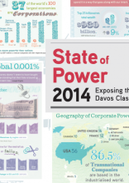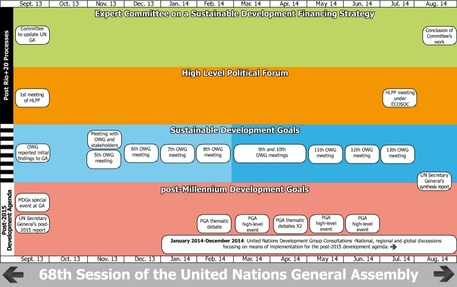 "London has retained its position as fDi’s European City of the Future 2014/15, while Germany’s Nordrhein-Westfalen has sailed to the top to rank first among Europe’s regions." Quoted is the FDI intelligence website of the Financial Times. The Dutch city of Eindhoven was also a new entry to the Top 25, ranking third. The city ranked first in the FDI Strategy category for all small European cities, thanks in part to its offer of incubation facilities at both the High Tech Campus in the city and the University of Technology Science Park, as well as its provision of ‘soft-landing’ services, which allow investors to establish links and develop a base in the city. Outside Europe Mexico appears as a good achiever in fDi terms having recorded the highest growth in fDi in 2013. Is fDi something to be proud of? What does it bring to the cities and countries concerned. More importantly, what does it mean if foreign funds find your town or country. Global Partnership for Effective Development Cooperation I am not sure about the linkage, but it may not be surprising that Mexico City will be hosting the successor of the Aid Effectiveness dialogues since 2002 successively held in Rome, Paris, Accra and Busan. The Global Partnership for Effective Development Cooperation as it is now called will open its doors in Mexico in April this year. The partnership has a steering committee that is comprised of representatives from receipient and donor countries, multilateral development banks, civil society organisations, parliamentarians, the private sector, the UN Development Group and the OECD. The forum is led by three co-chairs from Indonesia, Nigeria and the UK. In such meetings what usually needs close attention is the side meetings that are organised. Also during the recent ExCom meeting in Abuja a side-meeting was held under the heading: The Role of Businesses in Development Cooperation staging a serious input from the business society in the upcoming Mexico meeting. Sustainable Development Goals and the role of the State The partnership links strongly to a UN based multi-layered mechanism underpinning the 68th session of its General Assembly that prepares for the post 2015 era trying to develop a set of Sustainable Development Goals te replace the Millenium Development Goals. One of the processes underpinning the work of the UN is the Open Working Group on Sustainable Development. Since Rio+20 in 2012 they have met several times to do some stock taking on the achievements of the MDGs and prepare the ground for new goal setting. Following their last meeting earlier this month a draft report of the stock taking exercise was issued full of process and with little content.
Also in these meetings the programs of the side meetings may harbour the real change makers. During the recent Open Working Group meeting, a session was held with the International Forum of the Social and Solidarity Economy Entrepreneurs. This group comes together since 2007 in the so called Mont-Blanc Meetings. Their Mont-Blanc declaration is worth reading. The declaration argues in favor of a stronger state, not so much as redistributor of wealth but as facilitator of a Social Economy that obtains results in areas where capitalist enterprise, obsessed with short-term profits and subject to the dictates of its shareholders, has demonstrated its failure. Jeffrey D. Sachs and the role of the Private Sector In the meantime Jeffrey D. Sachs, former special advisor to Kofi Annan and now to Ban Ki-Moon, was asked to head a Network to do basically similar work to the Open Working Group. The Sustainable Development Solutions Network (SDSN) mobilizes scientific and technical expertise from academia, civil society, and the private sector in support of sustainable development problem solving at local, national, and global scales. The SDSN Leadership Council published its report An Action Agenda for Sustainable Development in June 2013, following an extensive public consultation on an earlier draft. The Action Agenda maps out ten operational priorities for the post-2015 development agenda and proposes 10 goals with 30 associated targets (3 per goal). Also the SDSN presented a draft containing 100 indicators for the goals and targets already identified in the Action Agenda. The draft report is still open for public consultation for a month (starting February 14 and ending March 14). Mr. Sachs envisages four basic pillars 1. Ending Extreme Poverty 2. Social Inclusion (Economy and Society that works for all) 3. Environmental Sustainability 4. Good Governance for Sustainable Development (not only of governments but also of corporates) Sachs is known as an advocate for engineering approaches to solving the worlds problems. He was also one of the architects of the MDGs. His preference for a stronger role for businesses can easily be noticed in his introductory talk for the SDGs. Mr. Sachs advocates for 'soft landings' of pre-commercial technologies in the public domain. Who is developing, who is investing? What strikes me in all these global processes is the absence of those impacted by all these policies and 'brave' decision making. Whether you belief in a Utopia created by Sachs or prefer a Civic Driven Change approach towards sustainable development, let us revisit the Foreign Direct Investment thing. Can FDI be conceived as foreign aid to rescue economies from failure? Is FDI disaster capitalism in duplicate creating new cross-border dependencies between public agencies and private equity. Reading the witness reports of many of the Master students reflecting on the impact of Foreign Direct Investment in their countries there are certainly two sides of the coin. Like with aid funding the question that every citizen needs to ask himself is: "Why are they minding our business?" For what reason did Mr. Guy Verhofstad and Mr. van Balen of the European Parliament support the uprising in the Ukraine. Was it really to comfort them in their political strife for a liberal democracy? Or were there some business interests to protect? For an overview of all the post-2015 processes and actors click here  Today the Dutch senate met to discuss the state of the constitutional state in an expert consultation. One of the speakers, Mr. Alex Brenninkmeijer, stated that a strong constitutional state is a hazard to a weak democracy. The former should be a product of the latter and not the other way around. He pointed to the negative impact of populism in the Netherlands, which causes all other parties grouping together united against the populist views. As a result the real countervailing power mechanism of opposition is undermined and replaced by populism. The case of legitimacy Also the State of Power report, recently published by the Transnational Insitute in the run-up to Davos, argues that "legitimacy (of the state) depends on democracy—otherwise all forms of power, where government is concerned, are merely variations on the theme of oppression whether called tyranny, dictatorship, or autocracy". The report continues to report on the state of power and reflects on the rise of a new set of values supporting "a new ideology of selfishness and cruelty". The changes that reflect these new values are taking place mainly in government which, in recent years, has been dominated by the neoliberal model. "It has been steadily gaining ground despite overwhelming proof that it is harmful to nearly everyone, except for the extremely wealthy and for the top people in the corporate sector" the report states. "The former goal of building a strong, healthy and lasting business enterprise well integrated into the community has been replaced by the single imperative of "shareholder value" Populism replaces healthy countervailing power In recente years, the Netherlands have witnessed a toxic mix of a neoliberal government having ruled the Netherlands with the Christian Democrats for a while with a populist party condoing it, and in the last few years the social democrats were drawn into a cabinet that pursues a progressive but intrinsically neoliberal agenda. The combination of small conservative (ChristenUnie & SGP) and progressive (D66) parties now supporting this cabinet pragmatically to keep this government in the driving seat only goes to show how divergence of views (normally expressed in public) is increasingly absent of the public debate. This illustrates the fear of countervailing power or difference of opinion. Even within parties differing views are not embraced but extinguished in order to win elections with a 'clear profile' that is ideally 'sold' to the electorate in a party program, with Utopia still on the horizon and realism left behind. Access to the courts The expert meeting naturally was much concerned about the poor access to the courts, currently guaranteed with subsidies, already suffer a 20% reduction in the nummer of court cases as a result of higher entrance fees. The austerity measures of the government implies a further reduction of 25%, for a large majority affecting the possibiltiy to file a case against the state. The solution could possibly be found outside the court room. If only authorities would take more time to meet the general public for dialogue and informed decision-making, similar cost reduction could be obtained according to Brenninkmeijer. Instrumentalising judicial power for governance purposes will weaken the constitutional democracy. Listening to the discussion (in Dutch) and reading the TNI report together may provide a clear picture of the State of Power in the Netherlands. A new series of U®conversations is being organized by URAIDE in Wageningen, featuring Fiona Dove, Executive Director of the Transnational Institute on February 28, 2014. |
About meMy name is Reinier van Hoffen. U®Reading
Click here for a summary.
Also find the text of a lecture Dr. Achterhuis held at the 2012 Bilderberg conference. Archives
August 2022
|
AddressNachtegaallaan 26
Ede, the Netherlands |
Telephone+31 (0)6 1429 1569
|
info@uraide.nl
|

 RSS Feed
RSS Feed
















